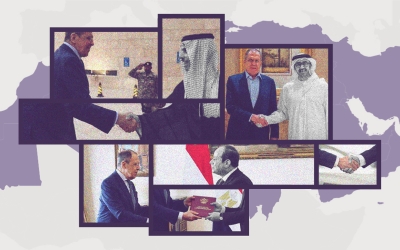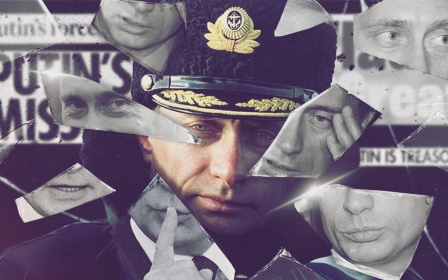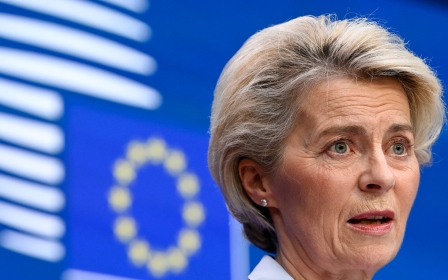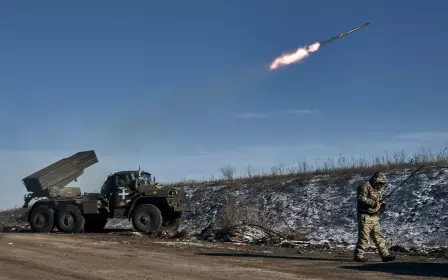Russia-Ukraine war: How the conflict altered defence ties in the Middle East
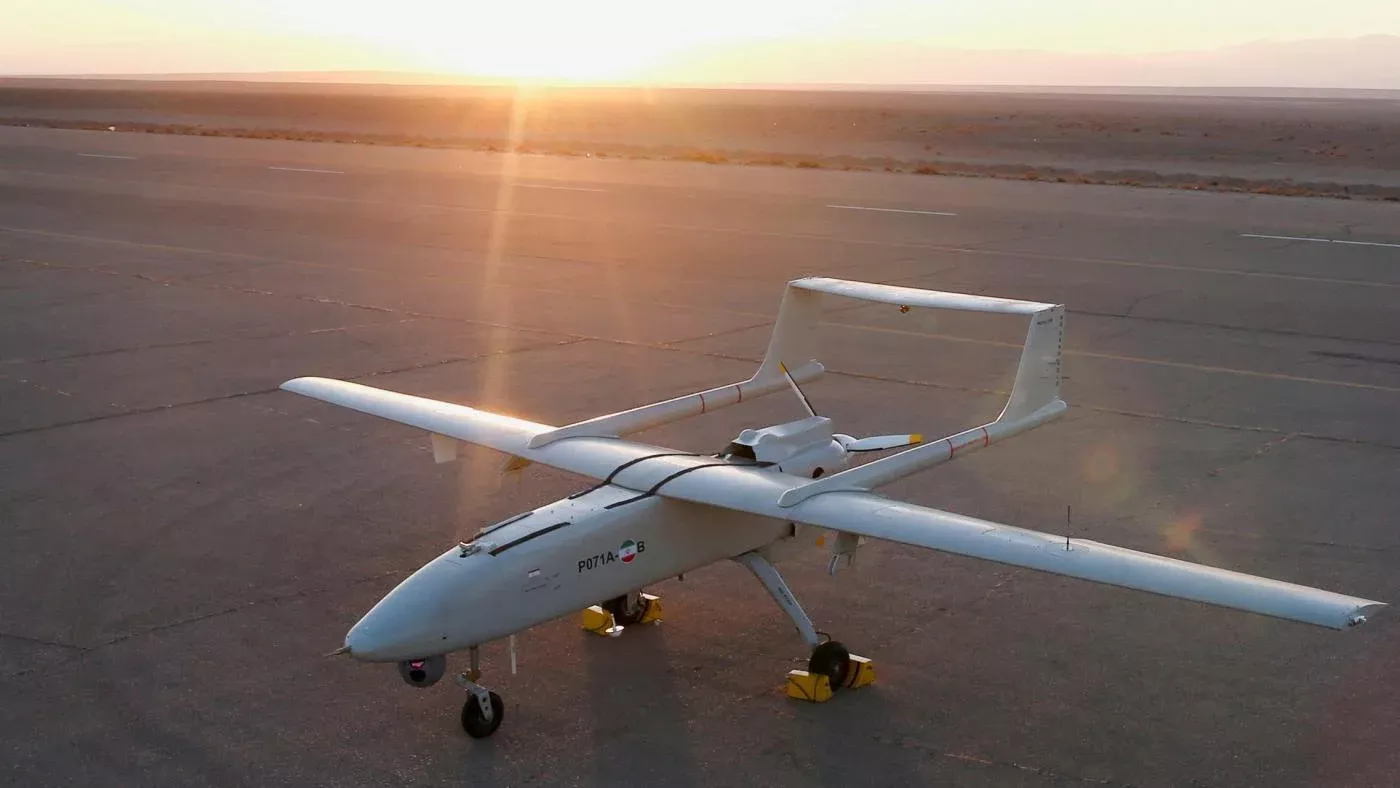
It's been a year since Russia launched its invasion of Ukraine, and Europe's biggest conflict since the end of the Second World War has had enormous ramifications for the Middle East.
Since the fighting erupted last February, Russia has expanded its military-technical relations with Iran to an unprecedented degree, and this could have significant strategic repercussions for the broader region.
Additionally, two major Middle Eastern powers, Turkey and Iran, have actively armed the two sides of this European war with their homegrown military drones.
Ryan Bohl, a senior Middle East and North Africa analyst at the risk intelligence company Rane, told Middle East Eye that the conflict had created two main dynamics.
"A serious questioning of the reliability of Russian military equipment versus Nato equipment, given how poorly many of Russia's high-end systems have performed in Ukraine, and a tightening of Iran-Russia military development."
In addition, western-leaning Middle Eastern states can no longer consider Russia a viable "backup" for their defence needs, compared to the United States.
"Not only is that equipment potentially not as efficient as they want, but ties with Russia will put them at risk of western sanctions," Bohl said.
"There is also an open question of how well wartime Russia can maintain defence exports when so much equipment is needed in Ukraine."
Middle East arming a European war
Before the war, Turkey sold Ukraine approximately 20 Bayraktar TB2 drones. Since the invasion, Ankara has more than doubled that, selling Kyiv at least another 50.
Regional heavyweight Iran has supplied Russia with hundreds of cheap Shahed-type loitering munitions (single-use, explosive-laden drones) that Moscow has used against Ukraine's electricity grid. Tehran consistently denies providing Russia with any drones since the outbreak of the war.
Iran and Turkey also have plans to build factories to produce their drones locally in Russia and Ukraine.
Bohl described Ankara and Tehran's supply of drones for this conflict as "unprecedented in modern history. Typically, Europe comes to the Middle East rather than the other way around," he said. "But while that's notable from a historical standpoint, the drones being supplied are just part of the array of weapons systems being used to fuel the war."
'The war in Ukraine is a showroom for Iran and Turkey'
- Nicholas Heras, New Lines Institute
Despite Iranian drones wreaking havoc on Ukraine's infrastructure and Turkish TB2s giving Kyiv some tactical advantages, Bohl pointed out that neither system has proven itself as a strategic game changer.
"Rather, with the war now bogged down in sluggish, World War 1-style battles, drones are just part of the strategic dynamics of both sides, and no more likely on their own to contribute to strategic changes than the deployment of any other single weapon system," he said.
Nevertheless, Ankara and Tehran believe that having their homegrown drones participate in this modern conventional war will prove beneficial.
Nicholas Heras, senior director of strategy and innovation at Washington think tank the New Lines Institute, says the big benefit for Iran is the opportunity to field test its weapons system in a war scenario.
"The Iranians will be able to take the lessons they learn from the Russian experience in Ukraine to apply them in the battlefield against Israel and in the scenario of an Iranian conflict with Gulf states like Saudi Arabia that have advanced anti-air weapons systems," he told MEE.
"The war in Ukraine is a showroom for Iran and Turkey."
Russia and Iran
One of the most significant strategic outcomes of the Ukraine war for the Middle East has been the deepening strategic relationship between Russia and Iran, exemplified by Iran supplying drones to Russia amid reported Russian shortages of precision-guided munitions and missiles.
In December 2022, the White House said Russia offered Iran "an unprecedented level of military and technical support that is transforming their relationship into a full-fledged defence partnership". It also warned that the expected Russian supply of Su-35s to Iran at some point in 2023 "will significantly strengthen Iran's air force relative to its neighbours".
"Russo-Iranian military cooperation is quite notable in that it's the emergence of a more coherent strategic military bloc between the two countries," Bohl said.
It is likely the two countries will continue to develop ties in drone and ballistic missile technologies, and likely also to cooperate on ways to evade western sanctions to smuggle in western technology for these programmes, Bohl added.
'The level of cooperation between Iran and Russia is indeed unprecedented'
- James Devine, Mount Allison University
On the other hand, it is unlikely Iran will deploy any significant expeditionary force to Ukraine due to ongoing domestic protests, and it's equally unlikely that Russia will become an overt guarantor of Iranian security.
Russia also would not welcome the prospect of Iran developing nuclear weapons, regardless of whether or not Tehran is a strategic partner.
"So, for now, it will be an alliance of drones and missiles - an alliance of asymmetric - rather than something akin to the close cooperation of Nato," said Bohl.
Nevertheless, such cooperation remains problematic for the Gulf states and Israel, especially given the latter's covert anti-Iran campaign.
"The level of cooperation between Iran and Russia is indeed unprecedented," James Devine, associate professor in the department of politics and international relations at Mount Allison University, in New Brunswick, told Middle East Eye.
"In 1988, Ayatollah Khomeini stated that Iran should align neither East nor West, but instead maintain its independence," he said. "Since then, Iran has cooperated with Moscow on a number of issues, but there has always been a degree of mistrust between the two sides and there were limits to which the two cooperated.
"Most importantly, perhaps, Iran never let itself get too close to Russia," Devine said. "In practice, Iranian policy was always more East than West, but Tehran always kept some ties to the West, particularly on the European side, and never let itself become a Russian satellite."
Iran: Recalibrating ties?
Since the outbreak of the conflict, this appears to be changing, although the war is not the sole reason.
Iranian President Ebrahim Raisi and his administration have shown they favour a more eastern-oriented foreign policy since entering office in 2021.
More generally, Raisi and his cabinet have been suspicious of the West and the previous government of Iranian President Hassan Rouhani. They were also sceptical about achieving any accommodation with the United States.
Devine pointed out that the faltering Iran nuclear talks have reinforced this tendency, as has the forceful response by the Iranian authorities, condemned by the West, to the internal protests that began in September.
By throwing its lot in with Russia in the Ukraine war, Iran seems willing to completely alienate the West, including Europe.
"I think it is not just that there are more arms being sold between the two, or that the level of economic cooperation has increased, it's that Tehran is willing to back Russia in what the West interprets as a direct attack on the liberal world order," Devine said.
Nevertheless, it remains to be seen if this is a viable strategy for Tehran in the long term, since there are already voices of dissent from within the Iranian elite.
Devine also noted that the "other side of the eastern equation is problematic for Tehran".
He gave Raisi’s recent trip to China as an example. During that trip, the Iranian president voiced his displeasure at the lack of progress being made in their bilateral relationship, following the 25-year cooperation programme that Iran and China signed in Tehran in March 2021.
"The fact that Iran has recently been in talks with Ukraine suggests that Iran may be trying to recalibrate the balance between East and West, at least a little bit," Devine said.
This article is available in French on Middle East Eye French edition.
Middle East Eye delivers independent and unrivalled coverage and analysis of the Middle East, North Africa and beyond. To learn more about republishing this content and the associated fees, please fill out this form. More about MEE can be found here.



